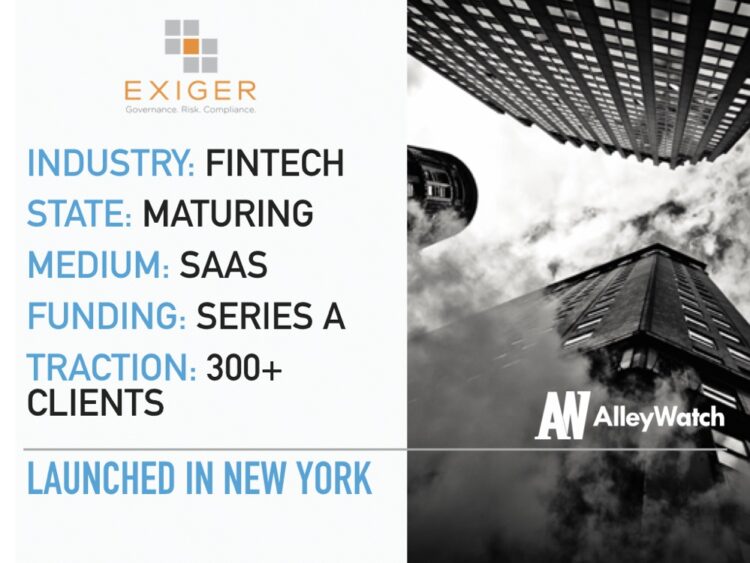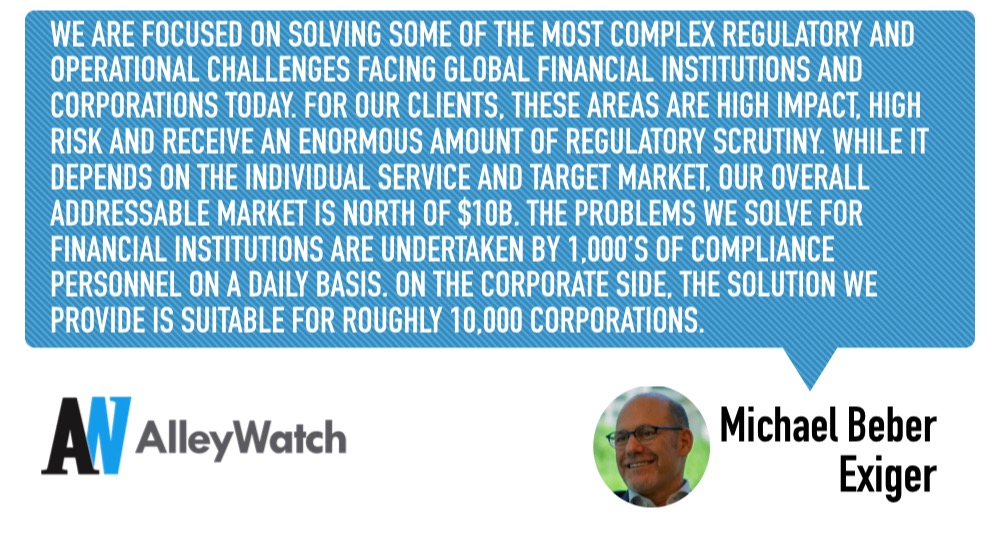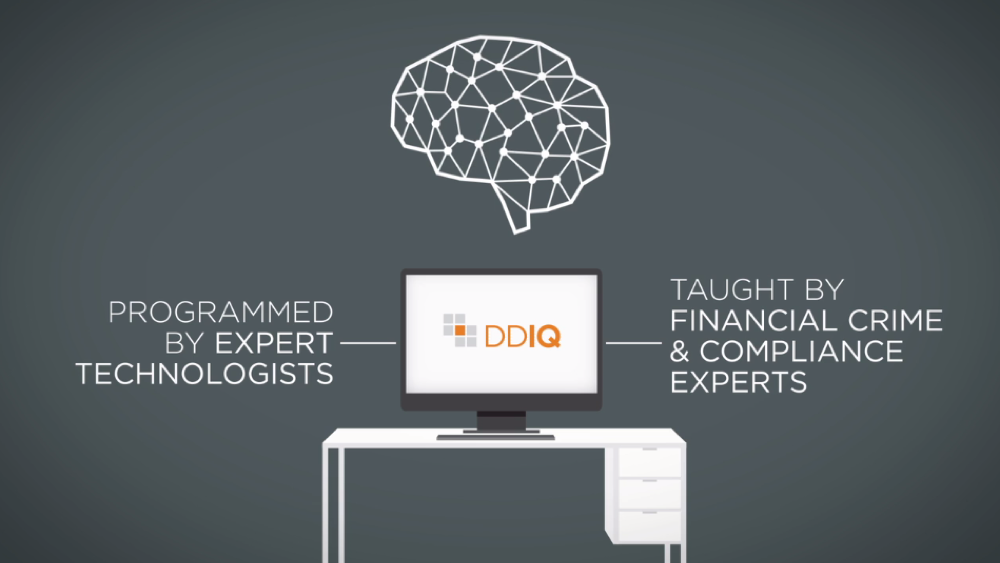Financial crime compliance is complex and arcane, with regulations changing swiftly. Institutions, government, and corporations need to adhere to a new set of laws and regulations that govern crime compliance that include the Bank Secrecy Act, the Foreign Corrupt Practices Act, and much more. As financial crimes grow more complex in nature so do these acts. Exiger has built a proprietary AI-driven platform that’s coupled with the founding team’s extensive experience to prevent any sort of financial wrongdoing and address regulatory and operational concerns.
AlleyWatch sat down with cofounder and CEO Michael Beber to learn about how Exiger came to fruition and how its risk-based cognitive computing platform addresses financial crime compliance seamlessly and efficiently.
Tell us about the product or service that Exiger offers.
Exiger helps some of the largest global financial institutions, multinational corporations, and government entities tackle financial crime and related compliance issues, including fraud, bribery and corruption, money laundering, terrorist financing, and sanctions violations. These issues are the bread and butter of our business.
 We are focused on helping our clients comply with global banking regulations, but not the kind that you might read about being rolled back right now. We’re not looking at product or service-specific regulations.
We are focused on helping our clients comply with global banking regulations, but not the kind that you might read about being rolled back right now. We’re not looking at product or service-specific regulations.
Instead, we have built our business around the laws and regulations that form the core of financial crime compliance, such as the Bank Secrecy Act (BSA), Foreign Corrupt Practices Act (FCPA) or the United Kingdom (UK) Bribery Act. These kinds of rules are here to stay and will only continue to grow in complexity.
Achieving sustainable compliance in this environment poses enormous challenges for the market. Exiger has invested in, built and deployed artificial intelligence (AI) backed technology to deliver scalable, efficient solutions.
How is Exiger different?
The combination of “from the industry” subject matter experts and cutting-edge technology doesn’t exist anywhere else in the market. Unlike our competitors, Exiger is willing to invest the time and resources required to deliver transformative purpose-built technology. Uniquely, our technology is informed by a team with first-hand experience in the businesses we serve, whereas most of our competitors have a staff of consultants, who have spent the majority of their career in the consulting world.
While our competitors are taking the game yard-by-yard, Exiger is focused on moving the chains with 25-yard passes down the middle. We’re playing to win.
What market does Exiger target and how big is it?
We are focused on solving some of the most complex regulatory and operational challenges facing global financial institutions and corporations today. For our clients, these areas are high impact, high risk and receive an enormous amount of regulatory scrutiny. While it depends on the individual service and target market, our overall addressable market is north of $10B. The problems we solve for financial institutions are undertaken by 1,000’s of compliance personnel on a daily basis. On the corporate side, the solution we provide is suitable for roughly 10,000 corporations. DDIQ, our risk-based cognitive computing platform, has the potential of becoming an industry-wide utility.
What is the business model?
Across our compliance, investigations, government services, diligence, and technology businesses, we look to bring together three ingredients – advice, process and technology. While we do offer pure services and/or pure technology, it’s the integration of multiple disciplines that makes our tech-enabled solutions value proposition so powerful.
What inspired the start of Exiger?
Exiger was born out of the HSBC monitorship. My business partner and cofounder Mike Cherkasky was selected by the Department of Justice (DOJ) to serve as the bank’s monitor as part of a Deferred Prosecution Agreement (DPA). At that moment we had a choice to solely run the monitorship or use it as the starting point to build a new business. Obviously, we chose the latter. Building businesses is what we do and what we had planned to do as we felt we could serve a critical need in the market and attract the best and brightest people to the monitorship.
Who do you admire in the startup world and why?
What I truly get excited about are startups that are disruptive. One of them is Napster. Napster said they were going to fundamentally disrupt how people consume music. The basic premise of getting your music online, organizing and consuming it, paved the way for all the major players in that space today, like Apple Music, Spotify, and YouTube.
Another company I’ve followed is StubHub. They took something that was fundamentally illegal – to upcharge and resell a ticket – and said, “you know what, we’ll create this online environment that gets buyers and sellers together.” Once they did that, the laws were changed to reflect that StubHub is really a brokerage environment.
And the third is Convene, which created ‘the workplace as a service’ model. Unlike WeWork, which leases space, cuts it into smaller pieces and makes it cool and available to other people, Convene fundamentally changed the way people operate, work and integrate within a building in its totality. That’s fundamentally different. Full disclosure, I was an early investor in the company.
What are the milestones that you plan to achieve within six months?
For us, it’s further maturing our pipeline, and closing and implementing our technology in more financial institutions. Continuing to onboard additional flagship clients in this area will continue to demonstrate to the market that we have both the expertise and the technological capability to drive consistent results. This will position us to organically build momentum and accelerate growth over the next couple of years.
What is the one piece of startup advice that you never got?
I wish I could have every person that we bring on board read “The Lean Startup,” by Eric Ries, to realize the importance of being judicious around investment –– and that evaluation and change is the norm, not the exception, as we adapt to our environment.
I wish I could have every person that we bring on board read “The Lean Startup,” by Eric Ries, to realize the importance of being judicious around investment –– and that evaluation and change is the norm, not the exception, as we adapt to our environment.
Everyone in business should have this mindset that all spend has to be seen as a form of investment.
If you could be put in touch with anyone in the New York community who would it be and why?
Michael Bloomberg. He’s created and executed a vision for the long term. Bloomberg was and is synonymous with critical data. He had a view of what would be important, created a business model, executed on it and has maintained its relevance ever since. He has stayed focused on his outcomes since the beginning. To me that’s incredible.
Why did you launch in New York?
I’d like to give you a more sophisticated answer, but it’s because my cofounder and I live in New York. As a company, however, Exiger’s footprint now spans eight cities and six countries.
What’s your favorite restaurant in the city?
That’s a tough one. If I want to go out with people and guarantee them a great total experience, it’s Avra Madison. The food is amazing and unique, and the atmosphere is quintessential “New York.”






